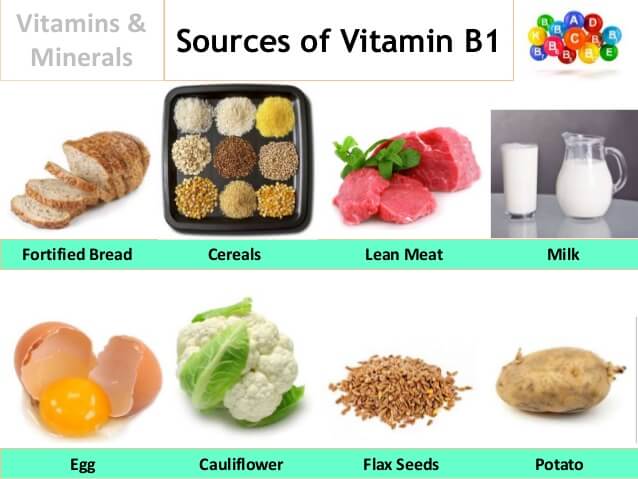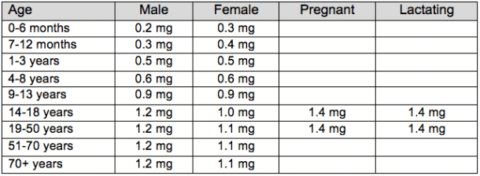
Thiamine, or Vitamin B1, is an essential nutrient required by the body. It has many health benefits, from protecting the brain and heart to boosting the immune system.
What is Vitamin B1 (Thiamine)?
Thiamine, also known as Vitamin B1, is essential for every tissue in the body. It is a cofactor for enzymatic reactions in the skeletal muscles, heart, liver, kidney, and brain [1].
Ingested Vitamin B1 from food and dietary supplements is absorbed by the small intestine through active transport at nutritional doses and by passive diffusion at pharmacological doses [1].
Most dietary Vitamin B1 is in phosphorylated forms, and intestinal phosphatases hydrolyze them to free thiamine before the vitamin is absorbed. Humans store thiamine primarily in the liver, but in very small amounts [2].
Snapshot
- Vital for metabolism
- Boosts the Immune system
- Supports brain function
- Helps digestion
- Protects the heart
Functions & Benefits of Thiamine
1) Metabolism
The body needs Vitamin B1 to make ATP, the body’s main energy-carrying molecule.
Thiamine helps in the conversion of carbohydrates into glucose, which is the preferred source of energy that the body runs off of to keep your metabolism running smoothly. It also helps break down proteins and fats [3].
Thiamine is specifically needed for a system of enzyme reactions called pyruvate dehydrogenase, which works to metabolize sugars that we eat [4].
Sugar Metabolism
Thiamine (as thiamine diphosphate, the main active form of the vitamin) is essential to glucose metabolism [5].
The proportion of people with type 1 or type 2 diabetes who have low thiamine ranges from 17% to 79%. Studies have found that increasing Vitamin B1 intake decreases the severity of symptoms associated with early-stage diabetes [6].
2) Immunity
Like other B-complex vitamins, Vitamin B1 is sometimes called an “anti-stress” vitamin because it may strengthen the immune system and improve the body’s ability to withstand stressful conditions [7].
Giving rats a Vitamin B1 blocker caused a significant decrease in immune system function [7].
3) Brain
Previous studies have reported low levels of thiamine and pyruvate dehydrogenase dysfunction in patients with ataxia, a condition that causes loss of movement. Long-term treatment showed significant improvements [8].
Vitamin B1 appears to help with the development of the myelin sheath, a coat that wraps around nerves to protect them from damage and death [9].
In the brain, it is required both by the nerve cells and by other supporting cells in the nervous system [10].
Autopsy studies have shown that thiamine-dependent enzymes have decreased activity in the brains of people with Alzheimer’s disease [11].
Supplemental Thiamine & the Brain
High-dose thiamine improved fatigue in patients after stroke [12].
Some researchers suspect that vitamin B1 therapy might have a favorable impact on neurodegenerative diseases such as Parkinson’s, Alzheimer’s, and Huntington’s disease [13].
Further research needs to be done before any conclusions can be made about whether it can help people with neurodegenerative conditions.
4) Cardiovascular Health
Thiamine is vital to the function of the cardiovascular system, and thiamine deficiency can cause congestive heart failure [5].
Supplemental Thiamine & the Heart
In a review of 20 clinical studies, supplementation with thiamine improved cardiac function in people with heart failure [14].
Compared against placebo, thiamine supplementation in 2 randomized, double-blind trials resulted in a significant improvement in left ventricular ejection fraction [15].
5) Cataracts
Recent studies suggest that thiamin may lower the risk of developing cataracts. These studies show that people who ingest plenty of protein along with vitamins A, B1, B2, and B3 (or niacin) in their diet are less likely to develop cataracts. Getting enough vitamins C, E, and B-complex vitamins further protect the lens of the eye (16).
6) Digestion
Thiamine is also necessary for the proper functioning of the digestive system. Vitamin B1 helps to regulate the production of hydrochloric acid, which is needed for maintaining proper digestive function [17].
Thiamine Deficiency
Wernicke-Korsakoff Syndrome
Thiamine deficiency is the established cause of Wernicke–Korsakoff syndrome (WKS), an alcohol-linked neurological disorder. Alcohol consumption can damage the brain through numerous mechanisms; one of these mechanisms involves the reduced availability of Vitamin B1 to the brain as a consequence of continued alcohol consumption [10].
Beriberi
Thiamine deficiency causes beriberi. Some of the symptoms include swelling, tingling, or burning in the hands and feet as well as trouble breathing because of fluid in the lungs [18].
People in developed countries do not usually get beriberi because staple foods such as cereals and bread are fortified with vitamin B1 [5].
Sources of Thiamine
| Food | Serving | Thiamin (mg) |
| Lentils (cooked, boiled) | ½ cup | 0.17 |
| Green peas (cooked, boiled) | ½ cup | 0.21 |
| Long-grain, brown rice (cooked) | 1 cup | 0.19 |
| Long-grain, white rice, enriched (cooked) | 1 cup | 0.26 |
| Long-grain, white rice, unenriched (cooked) | 1 cup | 0.04 |
| Whole-wheat bread | 1 slice | 0.10 |
| White bread (enriched) | 1 slice | 0.23 |
| Fortified breakfast cereal (wheat, puffed) | 1 cup | 0.31 |
| Wheat germ breakfast cereal (toasted, plain) | 1 cup | 1.88 |
| Pork, lean (loin, tenderloin, cooked, roasted) | 3 ounces* | 0.81 |
| Pecans | 1 ounce | 0.19 |
| Spinach (cooked, boiled) | ½ cup | 0.09 |
| Orange | 1 fruit | 0.11 |
| Cantaloupe | ½ fruit | 0.11 |
| Milk | 1 cup | 0.10 |
| Egg (cooked, hard-boiled) | 1 large | 0.03 |
| *3 ounces of meat is a serving about the size of a deck of cards [11] | ||
Dosage (RDA)

Heating foods can reduce their thiamine content. For example, pasteurization reduces thiamine content by 20% in milk [2].
